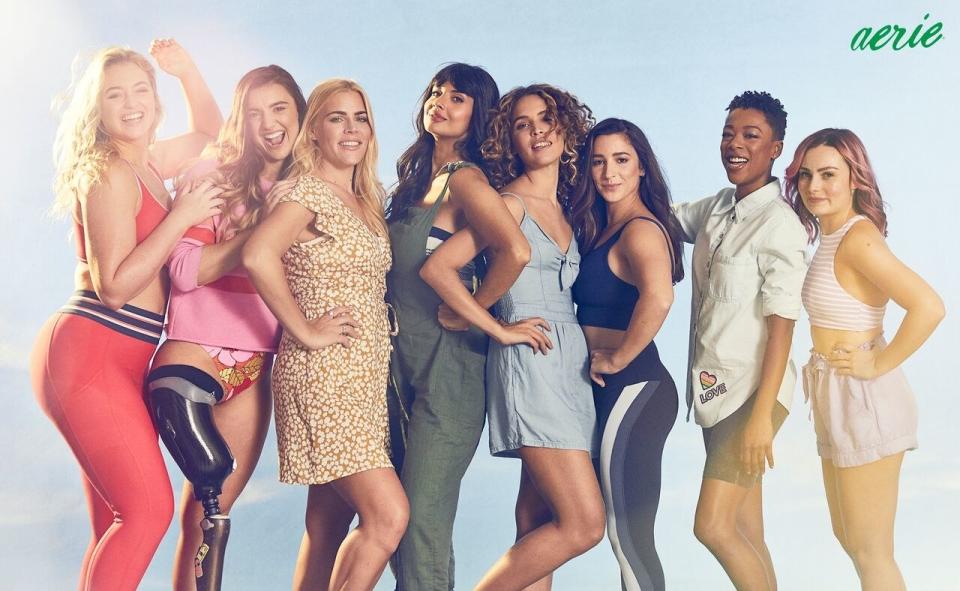Jameela Jamil Is a Force for Revolutionary Self-Acceptance
It only takes a minute of talking to Jameela Jamil to know that she’s not your standard celebrity. In the age of the publicist crafted statement and social media stock response, Jamil is refreshingly candid. On the phone from Los Angeles, where she films existential hit show The Good Place, every subject is fair game, but one topic takes precedence: doing right by her audience. “We have so much privilege as celebrities, it’s ridiculous just to take and never give back,” she says. “People hang off of every word of the biggest influencers; those people could shed light on so many important issues rather than just continue to perpetuate narratives that are harmful.”
Willing to point out the hypocrisies inherent in the airbrushed perfection that has become a commodity on social media, Jamil has become a voice of reason online, a fact that caught the attention of Aerie, the lingerie brand whose recent? unretouched campaigns serve as a converse of the Victoria’s Secret aesthetic. Jamil has been choosy when it comes to aligning with corporations, and she was moved by the company’s commitment to radical self-acceptance and its roster of like-minded spokeswomen, from Yara Shahidi to Iskra Lawrence. “Well Yara’s my personal hero, so I was excited to jump on board,” Jamil says. “I’d actually already been in their stores a few times and loved the brand because I was seeing pictures of women from all over the world with all different levels of ability, all different ethnicities, all different sizes, and shapes—all without airbrushing.”
Jamil has strong feelings about the use of retouching in ads, particularly those targeted to women. “It shouldn’t be allowed in makeup, anti-aging, or hair adverts,” she says pointing out the prominence of digitally manipulated photos in the beauty sphere. The tangible impacts of the technology are also worrying; with patients bringing Snapchat filtered shots of themselves plastic surgeons in an attempt to recreate the look in real life, Jamil feels it’s time to step back. “It’s impossible not to compare yourself to the artificiality,” she says. “I think it’s bad for society and for the person because it sets a precedent, it's dangerous to see that computerized perfection on a screen because it destroys your sense of perspective.”

Jamil has firsthand experience with the impact that unrealistic imagery can have on mental health. “I was someone who suffered badly from eating disorders and body dysmorphia as a teenager and as someone who was personally affected by what was a tenth of the assault that young women are under now, [that] gives me such a responsibility,” she says. Though she sought help at the age of 19, it took a decade for her to attain a new level of comfort with eating and her body. “The disorder lives on in your brain; you still feel afraid of food, afraid of your image, afraid of anyone seeing you without your clothes on,” she says. “At about 29 I just decided I was done with all of my problems. You know, I'd had anxiety and depression when I was younger and struggled a bit with OCD, and so I decided to go get therapy.” She credits the EMDR (Eye Movement Desensitization and Reprocessing) treatment she received with saving her life, but laments the continued stigma surrounding mental issues. “It [remains] something that no one takes seriously enough, especially when it comes to media and advertising,” says Jamil.
The lack of accountability is one reason why Jamil has been openly critical of celebrities who cash in on diet culture. On social media, where the promotion of detox drinks and meal replacements has become commonplace, she’s called out peers who’ve shilled questionable diet products to their followers. Her pointed comments on the accounts of Kim Kardashian and Cardi B. are a call for celebrities to accept a bit of responsibility for the role they play in upholding unrealistic standards. Her critiques have also come in the form of video spoofs, using comedy to point out the side effects of “tummy teas” and other diuretics sold under the guise of fitness.
Jamil has also channeled her energies into iWeigh, an Instagram-based online community that encourages young people to value their accomplishments rather than the numbers on a scale. The project began accidentally; fed up after seeing tabloid stories that focused on actresses’ dress sizes rather than their accomplishments, Jamil took to Instagram to vent her frustrations. “I've never seen a picture of a famous man with his weight written across his body, but I constantly see it with women even those who have earned hundreds of millions of dollars. They're self-made, talented, and great businesswomen, but they're reduced to nothing more than a number on a scale,” says Jamil. “I wasn't trying to start a movement, but so many thousands of people sent posts back to me that I didn't want to just disappear into the ether.”
A year later, iWeigh is thriving with nearly half a million followers. Pictures of body positive activists like model La ‘Shaunae Steward are featured alongside inspirational quotes, heartfelt messages from young women, and images of Sam Smith kicking up his heels and dancing. Focused on radical inclusion and being an empowering safe space for people from all walks of life, iWeigh has grown to encompass multiple perspectives and shed light on a variety of concerns—sexuality, representation, gender equality, and disability activism among them—connected to its theme of self-love. For Jamil, who has plans to expand the project eventually, its success has been heartening, but she wants its future to be about more than one person. “It'll be a platform that involves activists rather than just me being the voice for everyone which is ridiculous because I can't be, and I haven't experienced every single thing,” she says. “[iWeigh] is an opportunity for me to be able to properly give a platform to the activists that have been doing all of this hard work for the last ten years, who aren't listened to because society didn't give them a voice.”
With iWeigh thriving, another season of The Good Place on the horizon, and a return to hosting on the forthcoming game show, The Misery Index, Jamil’s schedule is jam-packed, but she wants to continue being a force for change. “I’m still the first South Asian I’ve seen on many covers and campaigns, and while I hope to be the first of many, as someone who never saw people who looked like me, I can’t understate the importance of representation,” she says. Committed to bringing about a future where young girls won’t share her experience, Jamil understands her dedication wouldn’t be possible if she hadn’t learned to accept herself. “I feel like I've got extra hours in the day that I didn't know were there because I spent 20 years just thinking about how I'm too fat, or I've got too much belly or too many stretch marks,” she says. “I look in the mirror, and I’m not worried about what other people think of me—it's been very liberating, and I'm getting a lot more done.”


